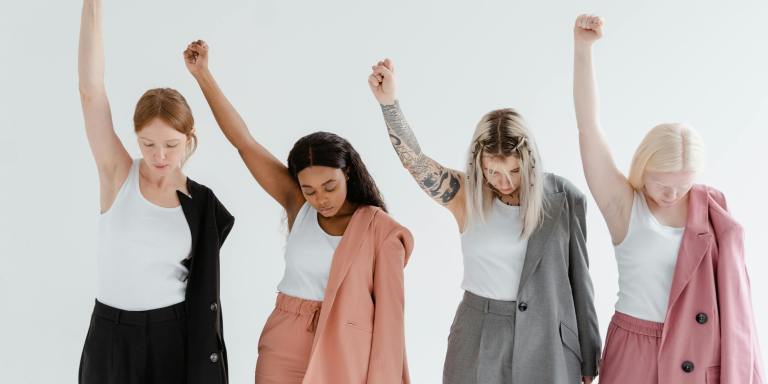Hookup culture offered the promise of female sexual liberation, empowerment, and agency, but it may have presented far more risks than benefits. Due to gender inequality, higher health risks for women, the prioritization of male pleasure, and double standards, some aspects of hookup culture may actually be harming women more than freeing them while disproportionately benefiting men. Although both men and women can experience dissatisfaction in hookup culture, many doctors, psychologists, researchers, and therapists note that hookup culture presents unique risks for heterosexual women. Here are the main reasons hookup culture may be more harmful to women than men and what the experts have to say:
Sexual Health, Double Standards, and The Pleasure Gap – Higher Risks for Women with Less Benefits
The Sexual Health Risks of Hookups Aren’t Equal
One of the major reasons hookup culture remains unequal for men and women is the fact that women overall undertake far more health risks when they engage in a hookup than men, with far less pleasure. Dr. Harold Hong, MD, a board-certified psychiatrist and medical director of New Waters Recovery, notes, “There is always risk involved with unprotected sex which could lead to unwanted pregnancies or sexually transmitted infections (STIs) if proper precautions are not taken. There are unique risks for men and women when it comes to STIs such as HPV.” Even with the use of contraceptives or protection, there is still a risk of STIs that can be passed on despite condom use and can affect a woman’s fertility or even cause cancer. “HPV can cause cervical cancer in women, which is why the Pap test is important for detecting abnormal cells and early signs of cancer. This is because the virus can be present on skin that the condom does not cover,” says Dr. Hong. “So even if proper precautions are taken, there is still risk for transmission of STIs like HPV. It’s important for people to get screened regularly so any pre-cancerous or precancerous lesions can be caught and treated quickly.” Dr. Hong notes that while men can also contract certain cancers from HPV, they tend to be less likely than women to develop serious health problems due to anatomical differences.
Dr. Neil Nedley, MD, a board-certified physician specializing in internal medicine explains, “HPV can occur even when all precautions are taken, and HPV is much more likely to cause severe life-threatening conditions in a woman than in a man. Men also get HPV, which can be associated with cancer of the penis, but is far less likely to occur than cancer of the cervix in women.” Unfortunately, this unequal risk is not eliminated by vaccination or disclosure. Research indicates a gender disparity in both the testing and prevention of STIs like cancer-causing strains of HPV.
The HPV vaccine only protects against some of these high-risk strains, as there are at least a dozen types that increase the risk of cancer. Men are not routinely screened for HPV, which makes them silent but deadly carriers of high-risk strains that can cause cervical cancer in women. They may not know they have HPV at all, so they usually cannot inform their hookup partners if they have it or not – the burden of disclosure and heightened risk is thus often unfairly placed upon women alone.
Apart from HPV, there are also other STIs that can harm women in life-threatening ways, especially in a hookup culture where unprotected sex is common. “Women also are more prone to undiagnosed gonorrhea, which can cause scar tissue in the fallopian tubes, increasing the risk of ectopic pregnancy and rupture of the tube,” says Dr. Nedley. “This can cause extreme pain and the need for emergency surgery to prevent death. Women are also more likely to obtain HIV during hookups than the other way around (a man getting it from a woman), although that can also occur.” There is also a difference in the rates at which men and women may undergo STI testing in general. Women are also more likely to be tested for certain STIs rather than men according to studies, which puts their health at unequal risk any time they have sex with a man who is not as conscientious about getting tested.
Physical Safety and Double Standards
Women also risk sexual coercion or assault, stealthing (removal of a condom without consent during sex), violence, and retaliation, especially in the form of revenge porn with less possibility for accountability if their hookup partner is a stranger rather than an acquaintance. These concerns regarding physical safety are not equal for men and women in hookup culture. As licensed clinical psychologist and therapist Miriam Koshy, MSc, MPhil, notes, “Due to the inherent physical vulnerabilities associated with casual sexual encounters, women may have heightened concerns about their personal safety.” As a result, Koshy says, “Women are more likely to prioritize safety precautions, such as meeting in public places, informing friends about their whereabouts, or relying on trusted social networks for potential partners. Men, on the other hand, may feel less vulnerable and may be less likely to prioritize these safety measures.”
Another risk is how men and women are still viewed differently in hookup culture and are not treated as equals. “Men tend to view hookup culture more positively than women,” says Joni Ogle, LCSW, a certified sex addiction therapist with over twenty-five years of clinical experience. “Some often perceive it as a chance to explore their sexuality without the responsibility of leading it to a real relationship. On the other hand, some women view hookup culture in a more negative light because they feel like they are being objectified or used for sexual pleasure only.” Research indicates that women who participate in hookup culture are often subjected to double standards and may be vulnerable to slander, gossip, and rumors designed to unfairly shame them and their sexual activities, even as their male partners are praised.
Hookups Have Fewer Benefits and Less Pleasure for Women
Unfortunately, generally speaking, the purported pleasures or benefits of hookup culture are unlikely to outweigh or compensate for these risks for women. Sociologist Dr. Elizabeth Armstrong and her colleagues sought to answer some pressing questions about the nature of hookup culture and situationships. Their studies revealed that hookup culture and situationships for women in a patriarchal society are saturated with inequality and dissatisfaction. While traditional monogamous relationships also present their own problems to women, hookups, and situationships don’t generally appear to provide a healthier alternative.
In one of their studies on hookup culture using data from a sample of 13,484 women, Armstrong and colleagues found that women tended to have orgasms more often in relationships rather than hookups, partly due to the double standards present in hookup culture where male pleasure is prioritized and expected, but not a woman’s. In relationships, a woman’s pleasure was more likely to be given attention. In a hookup, there is much less guarantee that your sexual partner will care about your pleasure as much as you care about his.
This discrepancy in whose pleasure is prioritized in hookups is inevitably gendered. Licensed psychologist Dr. Linda Baggett, PhD, notes, “Women are socialized to be people-pleasers and to put others first, including prioritizing the sexual pleasure of others. Men are socialized to feel entitled to sexual pleasure and to deprioritize women’s needs and pleasure.” Baggett says that while this can also be present in same-sex hookups, in opposite-sex hookups, these dynamics tend to reinforce each other. “As a result, I often see women consenting to activities that they don’t actually feel great about or being afraid to really take up space as an equal, and men are less likely to create an environment that supports women doing this. The result is women often have hookups that do not feel physically or emotionally healthy or satisfying.”
One way to set healthy boundaries in hookup culture is to honor your own needs and check in with your own comfort, Baggett advises. “Listen to your gut and honor your needs, whether that’s asking for more foreplay, insisting on using protection, or saying no to activities and encounters that you don’t like or that don’t feel right to you.”
These inequalities can be present in more traditional monogamous relationships as well, although to a lesser extent. In heterosexual romantic relationships, the orgasm gap still exists – with 95% of heterosexual men saying they almost always had an orgasm during sex versus only 66% of heterosexual women saying they did in a 2016 national study of 52,588 adults. Among women who do orgasm during sex, they also tended to be more satisfied with their relationship outside of the bedroom. This lets us know that whether in hookups or relationships, the orgasm gap and gender inequality need to be addressed. We know from other research that relationships are still affected by gender inequality as well in terms of the division of domestic labor and emotional labor.
It should be emphasized that most of the risks and inequalities mentioned so far still exist in more traditional and monogamous relationships too, albeit in a different way and some to a lesser extent. Yet these risks are often minimized in a way that makes hookup culture appear “equal” and completely safe for both men and women in a way that defies reality. However, it appears hookups aren’t doing anything to alleviate that inequality and may actually be providing even fewer benefits to women while disproportionately catering to and prioritizing male pleasure. Every situation is different, but it can be helpful for women to develop a healthy skepticism about the risks they undertake when it comes to hookups and think about whether the benefits really outweigh the costs when it comes to their casual sex partners on a case-by-case basis.
Emotional Trauma is Still a Risk If You’re Pressured To Participate
Women may also experience more emotional distress from hookups and situationships especially if they find themselves feeling pressured into hookups if what they really want is a relationship or dating. For example, some studies show women can experience more depressive symptoms related to hookups than men do and may expect sex to evolve into a relationship. Women can also experience significantly more regret than men after casual sex. Other studies suggest that for both men and women, casual sex was related to psychological distress such as depression and anxiety. Study participants also reported lower levels of self-esteem, life satisfaction, and happiness than those who had not engaged in casual sex recently. In a dating culture where misrepresentation of one’s true self is common, some women may also find themselves being manipulated by a narcissistic partner who insidiously violates their boundaries by pretending to want something more when their only agenda is sex. Or they may be manipulated by a toxic, exploitative partner who causes them to invest in a more long-term “situationship” only for the relationship to be shrouded in ambivalence and a lack of accountability.
Therapists note that, generally, hookup culture appears to have a different effect on women than on men.
Clinical psychologist Dr. Holly Schiff, PsyD, asserts, “In my experience as a therapist, I have found that hookup culture generally does have a different impact for men versus women. Clinically, I have seen that women experience more negative psychological consequences than men. After engaging in hookup culture, women usually feel more lonely, rejected, and unhappy. Usually, they are also worried about being judged by others for their behavior. Men on the other hand usually feel more sexually satisfied, confident and happier.”
Therapist Sarah Rollins, LMSW also says, “Taking into account that gender is fluid, I have noticed significant differences in regards to the impact of hookup culture for men and women. Generally speaking, women tend to become more anxiously attached to men during a hookup situation, even if it was made clear at the beginning that a relationship was not on the table.”
A proponent of hookup culture may argue that women who don’t like hookup culture can just simply not participate in it. While that may be true, male sexual entitlement is solidified by the fast-paced instant gratification now offered on dating apps. Research indicates that women on dating apps can still be subjected to various forms of sexual offending regardless of what they’re looking for – everything from unsolicited crude pictures to the promise of “dates” which later turn out to be excuses to violate boundaries. It has become normalized to fast-forward physical intimacy in a way that it hasn’t been normalized before. This makes it difficult for people to avoid the potential dangers of hookup culture even if they aren’t active participants.
“When navigating hookup culture, the one piece of advice I would give to women is for them to be honest with themselves about what they want,” says Schiff. “The hookup culture requires some form of emotional detachment, and if you know you are incapable of that, then it is probably healthiest for you to not engage in it. In order to survive today’s hookup culture, know what you are getting yourself into, and be emotionally prepared.”
Rollins advises, “Above all else, listen to your body. In navigating hook up culture, what is going to guide you best is not your intellect, brain, or education. Rather, it is your gut. Your gut sense will tell you when to approach or leave a situation. Your gut sense will guide you towards safety. When you ignore the hints your body gives you, you are no longer having an embodied and therefore conscientious experience.”
With more men expecting hookups and more women treating it like the new normal, women who don’t wish to participate in hookups can still feel the pressure of these new dating expectations. On the other end of the spectrum of dangerous “purity culture” lies the shaming of women who are deemed sexually repressed or frigid if they are unwilling to participate in these social norms. As a result, some women may feel subconsciously pressured into experimenting, or they may even be sexually coerced and still face the dangers of hookup culture even if they don’t wish to participate. And when they do participate, there can be unforeseen consequences. Some psychologists have even suggested that since studies show women can be more sensitive to the bonding effects of oxytocin than men, this may make women more susceptible to getting attached and bonded to their sexual partners than men do. The question of whether men or women get more attached after sex remains up for debate, but generally speaking, hookups can be emotionally distressing for even those who seek out casual sex but find themselves having more serious feelings for their sexual partners.
The Big Picture
It’s wonderful that women have more sexual agency and freedom in the modern dating world – what’s not wonderful are the double standards, unmitigated risks, and dangers that still come with exercising that freedom. If we actually want to liberate women, we have to work toward building a world where it’s safe for them to exercise their options and choices in the first place. We must work toward closing the gender gap when it comes to sexual health and pleasure, holding sexual predators accountable, reducing double standards, and ensuring that men also are doing their part in reducing risks and protecting the sexual and emotional health of their partners. We must also prioritize a woman’s pleasure and safety instead of simply catering to men. Instead of a culture of instant gratification and a laissez-faire attitude toward casual sex where men disproportionately benefit, we must build a world based on the principles of mutual respect and pleasure, safety, and consent.








